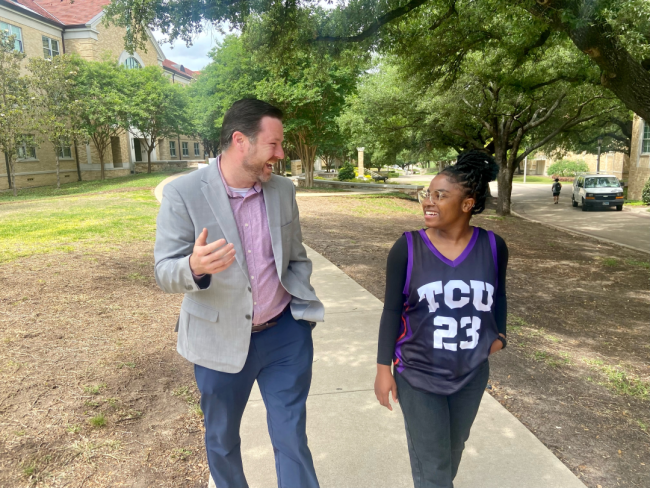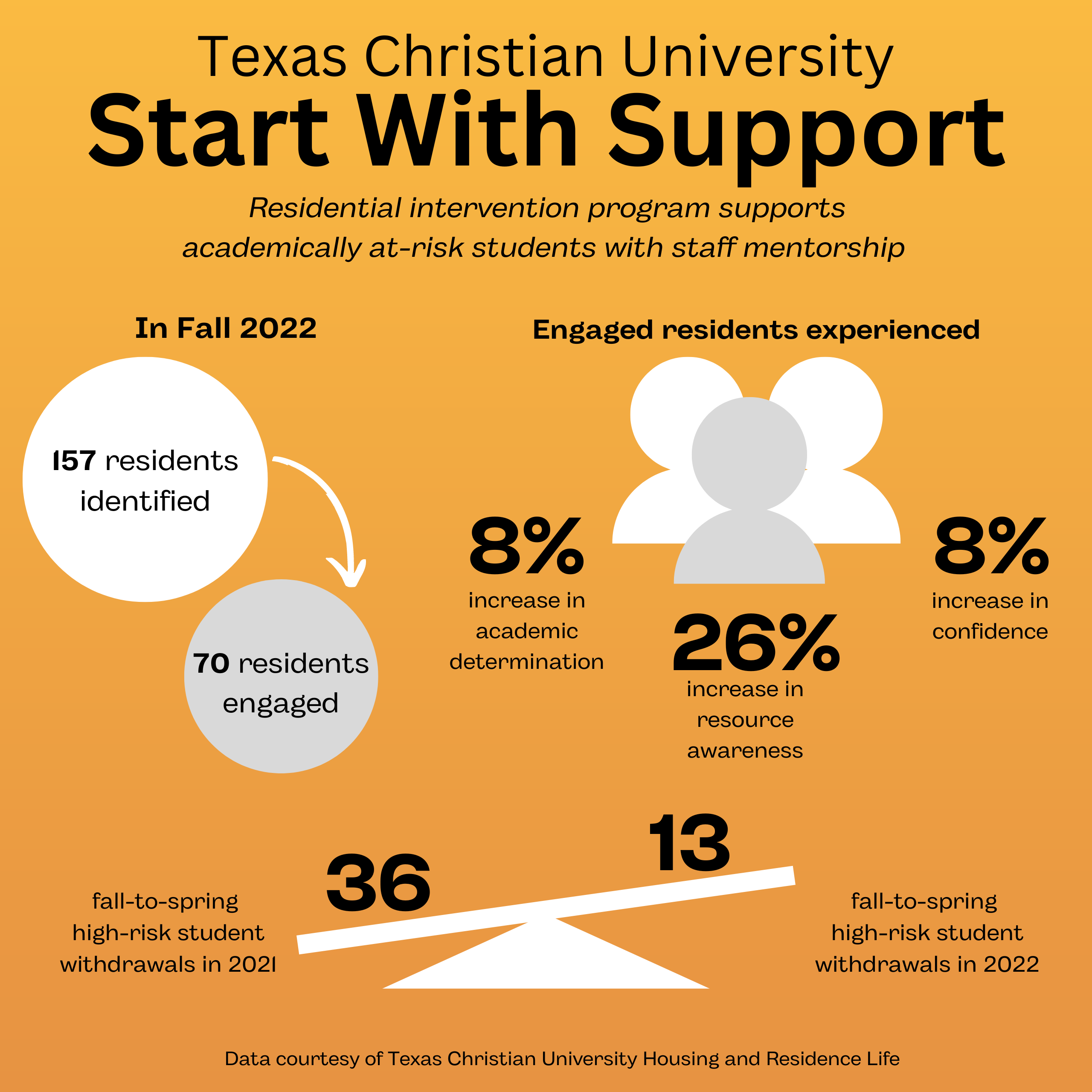You have /5 articles left.
Sign up for a free account or log in.

Texas Christian University residence life staff partner with residential students to promote academic outcomes.
Texas Christian University
Texas Christian University’s housing and residence life launched a relationship-based intervention for academically high-risk learners at the start of the term in an intentional and personal way to boost retention.
Start With Support (SWS) aims to connect residential students to their academic goals while also fostering a sense of closeness with their residence hall staff.
“You can’t achieve belonging without relationships,” says Jason Titus, associate director of academic initiatives and residential student success. “The skills are important—like, they absolutely are. But … if you don’t think I care about you, your likelihood of learning for me is really low.”
What’s the need: Titus established SWS around TCU’s model of Knowing, Connecting and Empowering, which encourages staff to know their residents, connect them to campus resources and empower them to be a better version of themselves.
“When I started diving into student success in general, one of the things that I realized pretty quickly is almost all of the models I could find were skill-based: trying to identify an absence of an ability or skill and teach them that,” Titus explains.
TCU’s Student Success Office, for example, uses a solution-based model teaching students time management or how to prioritize to achieve academic success.
But in residence life, Titus determined, “that won’t work for us, because the gasoline that makes our truck run is relationships,” he says. “My hypothesis is, if I start with relationships, they’re going to be more likely to trust the skills that I’ll then deliver next.”
Of TCU’s 12,000 students, around 5,400 live on campus. The university also has a two-year residency requirement for its first- and second-year undergraduates.
SWS, at its core, involves establishing continuous relationships with students to create academic readiness within the first two years of their college experience to improve persistence and retention across the board.
How it works: Titus trained TCU’s hall directors, the full-time staff who supervise residence halls, on how to engage with students in a relationship-based academic intervention before the beginning of the academic year.
Within the first four weeks of the semester, housing and residence life staff identify academically at-risk students—those with a cumulative or semester GPA at or below 2.0.
Each hall director is assigned a handful of students—eight per person in fall 2022 and five or six in spring 2023—for whom they are responsible. Hall directors then initiate outreach to the student via email, text or phone, typically in that order, Titus says. If students are completely unresponsive to communication, hall directors will knock on their doors, as well.
“One of the things that I’ve learned about this particular population of students is the resources need to get into the student’s way,” Titus says. “Not many students will go someplace else to find the resource … instead: How do we put the resource in the student’s way so they have to engage?”
During the conversation, staff establish a relationship with the resident and then offer support in their academic goals. The most common concerns have been time management, priority management or how to calculate grades.
After the initial outreach, staff members provide a follow-up to the student with some encouragement and the offer of another meeting at the end of the semester, if desired.
An online presence: Titus developed residential academic support videos in fall 2022, short YouTube videos in which he offers guidance on success skills like asking for help, preparing for academic advising or communicating with a professor over email.
These support videos help foster relationships with students because they feel more comfortable meeting with Titus in person, amplifying his reach with residents.
“Students are coming into my office, and they’re like, ‘Hi, Dr. Titus!’ like they know me, but I’ve never met them. And it’s because the videos that they’re getting have allowed for them to engage with me before they’ve had to engage with me,” he explains.
The outcomes: TCU staff identified 157 residential students who may have needed academic support in fall 2022, and 70 of those students engaged in SWS. In spring 2023, staff identified 101 students for SWS, and 51 residents participated.

Ashley Mowreader | Inside Higher Ed
A pre- and post-SWS student survey found students’ confidence, academic determination and resource awareness grew as a result of SWS. Of the students who participated in fall 2022 intervention work, 61 students returned to good academic standing, or had an 87 percent “graduation rate” from SWS.
“If you’re really trying to foster relationships, for me, it’s much more powerful, and I think the data bears that out,” Titus says.
Getting buy-in: Some housing staff were reluctant to engage in academic work during fall 2022, but after seeing the outcomes from the first semester, they had better buy-in the second semester, Titus says. “What they weren’t realizing is how much equipping students on the academic side … actually lessens your load in the other areas of care.”
Behavioral outcomes improved among academically at-risk students, which Titus attributes to having a relationship with the residence hall director and a result of less academic stress on the student. Across the university, critical incidents decreased in the 2023 academic year as well, which Titus can’t attribute to their work specifically, but he hopes their work supported it.
SWS also improved staff members’ confidence in resourcing students because they were better equipped to answer students’ questions, creating improved engagement.
The next steps: After completing the program’s first year, TCU housing and residence staff will make some small adjustments to the process. Training for hall directors will be more precise and outreach to students will be more specific, as well.
One area of interest is creating a balance between TCU’s College 101 Mentorship program, which provides academic advising for first-year students with an academic warning or probation to create a faculty or staff to student mentorship experience.
“What we’ve started doing is [figuring out] how we bridge our relationship-based experience into that so we’re not necessarily overlapping, but there’s intentionality between,” Titus says.
In the future, Titus hopes to further partner with faculty members to understand where students need improvement in their preparation to learn.
This story was submitted to us from a reader just like you! Share your student success initiatives with us here.




